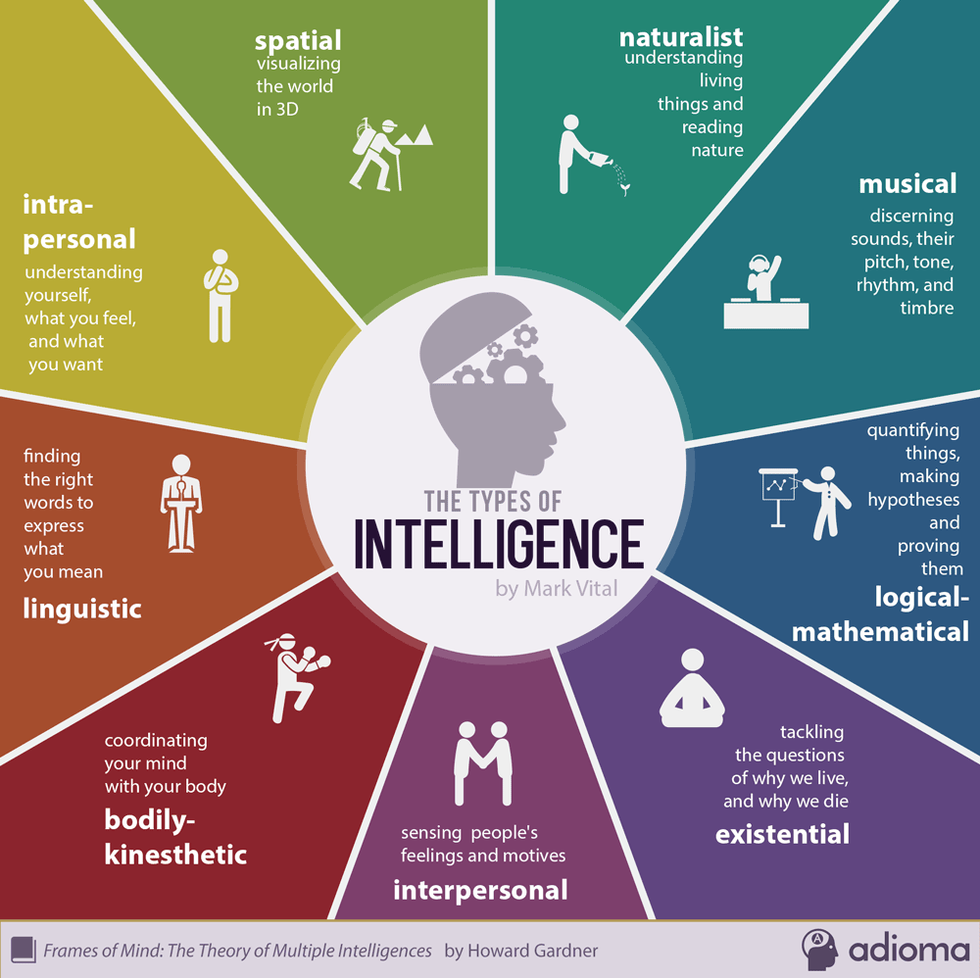Many of us feel there are two categories of intellect: Intelligent, and unintelligent. What most of us do not know is the nuance and depth of the human brain. Mental horsepower is more than just a binary. It is a spectrum and isolated and interrelated lobes and systems. Doctor of Education Howard Gardner of Stanford developed a theory in the early '80s describing these separate yet intrinsically linked forms of intelligence. Unsatisfied with the arbitrary nature of a one-score IQ test, Gardner was compelled to explore the different types of processing brains undergo. His thesis suggests that "each of us has a number of relatively independent mental faculties, which can be termed our 'multiple intelligences.'
The Institute for Learning supports Dr. Gardner's theory and implies a shift in how we view, shape, and understand our own minds to be underway
"Dr. Gardner says that our schools and culture focus most of their attention on linguistic and logical-mathematical intelligence. We esteem the highly articulate or logical people of our culture. However, Dr. Gardner says that we should also place equal attention on individuals who show gifts in the other intelligences: the artists, architects, musicians, naturalists, designers, dancers, therapists, entrepreneurs, and others who enrich the world in which we live."
So, what are these categories and which ones do you feel describe your strengths? Which intelligence's do you need to give more attention to? In the theory of multiple intelligence, biological predisposition for success/talent in one category is not needed to develop a stronger sense of intelligence or identity.
Gardner argues that: " there is a wide range of cognitive abilities, but that there are only very weak correlations among them. For example, the theory postulates that a child who learns to multiply easily is not necessarily more intelligent than a child who has more difficulty on this task. The child who takes more time to master multiplication may best learn to multiply through a different approach, may excel in a field outside mathematics, or may be looking at and understanding the multiplication process at a fundamentally deeper level."
There are nine categories of cognition. Mark Vital, a designer, and educator sum them up well in his article on the intelligence system.
- Naturalist (nature smart)
- Musical (sound smart)
- Logical-mathematical (number/reasoning smart)
- Existential (life smart)
- Interpersonal (people smart)
- Bodily-kinesthetic (body smart)
- Linguistic (word smart)
- Intra-personal (self smart)
- Spatial (picture smart)

Musical or Rhythmic Intelligence.

The piano is an incredible tool to educate and foster musical intelligence. It is a foundation instrument--that when learned, many others can follow.
Whether you've taken to music as if you were designed to, or if you've studied for years and are just now beginning to understand the language of music, you have a hefty musical intelligence. Rhythm intelligence can refer to pitch, tone, timbre, phrasing, timing, melody, aural effectiveness, the ability to play musical instruments or sing, the ability to recall songs, the ability to feel emotionally moved by a piece of music, the ability to compose music, and/or simply the ability to keep beat. This type of intelligence is singular as the brain only activates certain parts of itself when playing or listening to music, and no other time.
Moral/Existential Intelligence.

Peace with the questions of "why" we are here and our place in this world constitutes as a developed existential intelligence. Moral intelligence also explains those who are assured in different paradigms of moralities such as religion, the armed forces, or organizations such as Peace Corp. Someone with a firm moral intelligence can articulate what is right and what is wrong.
Interpersonal.

Interpersonal intelligence is also known as social intelligence. Social workers, team sports players, consultants, actors, and dancers tend to have a high capacity for interpersonal intelligence. Interpersonal intelligence is the ability to interact successfully (get what you want/give what they want) with another or a group of people. This includes the abilities to perceive and respond accordingly to other peoples emotions, body language, facial expressions, tones, and moods. If you find yourself getting into a lot of fights and are unsure why you may want to explore the theory of interpersonal intelligence to guide you to a more skillful/desirable outcome in social settings.
Those who have lower capacities for interpersonal intelligence may have triggering events, foundation relationships or traumas that result in a disconnect or distrust between the self and the selves of others.
Intrapersonal.

Intrapersonal intelligence may be the most complicated and subjective of them all. Intrapersonal intelligence is the stability in which you define and internalize your identity which includes your sense of self, thoughts, goals, roles, feelings, and decisions. People with stronger senses of intra-personal intelligence may come across as more confident or outspoken. They may also appear introspective or anti-social and keep to themselves because they have already validated themselves and do not require affirmations.
Bodily or Kinesthetic Intelligence.

Body intelligence means you feel at one with your body, mind, and soul. If you are bodily intelligent you will have learned to listen and respond to your bodies needs for activity, precision, and care. People who have high body intelligence are able to perform meticulous physical challenges such as an obstacle course or a surgery.
Linguistic Intelligence.

Linguistic intelligence is one of the most accepted versions of intelligence out there. Most authors, politicians, and professors are highly linguistically capable. If you sound smart, you tend to embody smartness. Linguistic intelligence includes word choice, syntax, complex/metaphorical meaning, rhetorical analysis, critical textual thinking, and the ability to express oneself and ideas through verbal structure. Not having a knack for public speaking but you can articulate yourself alone does not mean you are not linguistically intelligent, but it may mean you excel in linguistic intelligence intrapersonally over interpersonal or performance intelligence.
Spatial Intelligence.

Artists, designers, architects, and even race-car drivers tend to have incredible spatial intelligence. Spatial intelligence refers to the ability to organize and carefully manipulate themselves in relation to imagery or objects in space. Spatial intelligence is related to mathematical intelligence but it works more on spatial intuitions than formulas.
Naturalistic Intelligence.

Communion with nature is key to naturalistic intelligence. Farmers, environmental workers, and those who work with animals tend to be apt naturists. Naturalistic intelligence is usually defined by awareness, sensitivity, respect, and efforts to understand, protect, and feel closer to the environment.
Logical/Mathematical Intelligence.

Mathematical intelligence is what educators usually use to gauge intelligence. Logical intelligence includes the ability to synthesize, compare, hypothesize, and process not only numbers but variable situations and cause-effect relationships or functions. Those more logically oriented probably are quick problem solvers and can use deductive reasoning to come to supported conclusions. These people can be anyone from a detective to a video-game strategist to a chemist.
Although the scope of human Intelligence may never be fully understood, we do know humans are multi-faceted and adaptable creatures whose minds are far more vast and capable than we first imagined.



















